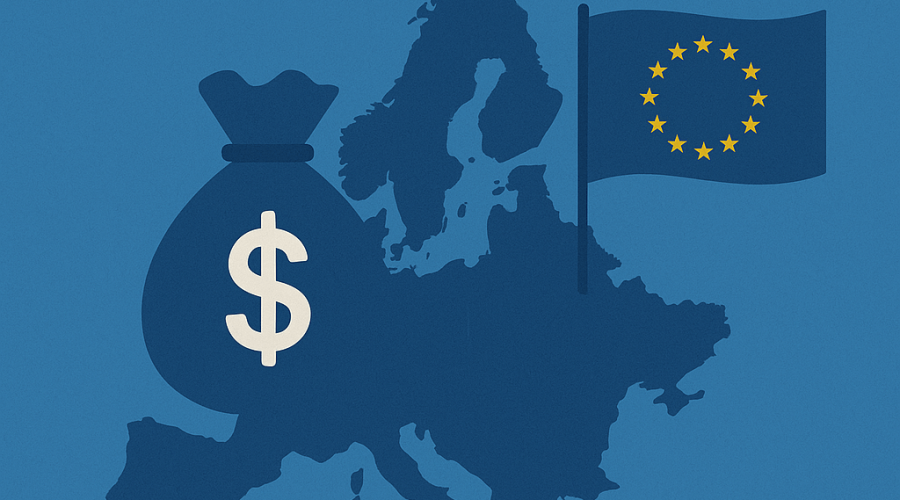
Thinking of going global? An offshore company formation can be a powerful strategy for international business and asset protection. An...
Europe captivates with its rich history, diverse cultures, stunning landscapes, and high quality of life. For many entrepreneurs, professionals, retirees, and digital nomads, the dream of living on the continent is powerful. But beyond the charm, practical considerations like taxation play a crucial role in deciding where to settle. Fortunately, Europe isn’t monolithic in its tax policies. Several nations offer highly attractive tax regimes, making them stand out as low tax countries in Europe. Some might even be considered among the tax free places in Europe for certain types of income or specific residency statuses. The continent hosts a range of opportunities, from low flat taxes to special programs for foreigners, and even zero tax on certain income streams.
Navigating the complex world of European taxation requires careful planning and understanding. While the European Union aims for some level of coordination, tax sovereignty largely remains with individual member states (and non-EU European nations). This creates a landscape of opportunity for those seeking to optimize their tax burden legally by exploring European tax free countries or those with highly competitive rates. However, it’s also a landscape fraught with potential pitfalls if not approached correctly. Factors like residency rules, the source of your income, double taxation treaties, and your home country’s regulations all come into play.
This guide explores some of Europe’s most tax-friendly jurisdictions in 2025, delving into the specific advantages they offer, who they might benefit, and the key considerations involved. We’ll look at established financial centres and emerging low tax countries in Europe that are gaining popularity. Remember, tax laws are complex and subject to change; this article provides a general overview and should not substitute personalized advice from qualified tax professionals.
Before diving into specific countries, let’s clarify some common concepts relevant to finding tax free places in Europe or jurisdictions with favourable regimes:
Residency-Based Taxation: Most European countries operate on a residency basis. If you are considered a tax resident (usually based on spending over 183 days a year or having your primary home or centre of vital interests there), you are typically taxed on your worldwide income. The goal for tax optimization often involves establishing residency in a country with a favourable system, potentially one counted among the countries with lowest tax burdens overall.
Non-Domiciled (Non-Dom) Regimes: Offered by countries like the UK (though undergoing significant changes/phase-out), Ireland, and Malta. This status often allows residents who are not “domiciled” (essentially, considering the country their permanent home) to be taxed only on income earned within the country or income remitted into the country. Foreign income kept abroad may remain untaxed by the host country, making these locations function similarly to tax free countries in Europe for specific income types. These regimes are often complex, may have time limits, and are subject to political shifts.
Territorial Taxation: Some jurisdictions, like Georgia and Gibraltar (a British Overseas Territory), tax residents primarily on income sourced within their borders. Foreign-sourced income may be tax-free, making them attractive options for those seeking the benefits of European tax free countries for their international earnings.
Lump-Sum Taxation: Famous in Switzerland (primarily at the Cantonal level), this system allows eligible wealthy foreign residents to pay a fixed annual tax based on their estimated living expenses (often calculated as a multiple of rental value) rather than their actual worldwide income or wealth.
Special Regimes for Foreigners: Some countries implement specific programs to attract talent, investors, or retirees. Portugal’s Non-Habitual Resident (NHR) scheme was a prime example, offering significant tax breaks for a decade (though it officially ended for new applicants end of 2023, transitional measures and a new, more limited ‘incentivised tax status’ exist). Cyprus offers exemptions for foreign-source dividends and interest for non-domiciled residents, adding it to the list of low tax countries in Europe for investors.
Low Flat Tax Rates: Countries like Bulgaria and Romania offer relatively low, flat income tax rates applicable to most residents, simplifying the tax system and making them attractive compared to progressive systems in higher-tax nations. They are often cited when discussing countries with lowest tax rates in the EU.
Double Taxation Treaties (DTTs): Europe has an extensive network of DTTs between countries. These agreements prevent individuals and businesses from being taxed on the same income in two different countries and allocate taxing rights between the signatory nations. Understanding the relevant DTT between your home country and potential new country of residence is vital, even when considering tax free countries in Europe.
EU Scrutiny: The EU maintains a list of “non-cooperative jurisdictions” for tax purposes, primarily focused outside the EU. However, it also monitors member states’ tax practices to ensure fair competition and combat harmful tax regimes. This means special tax schemes within Europe can come under pressure and may change over time.

Here’s a look at some European nations known for their favourable tax environments, including potential tax free places in Europe and established low tax countries in Europe:
Here’s a look at some European nations known for their favourable tax environments, including potential tax free places in Europe and established low tax countries in Europe:
Country | Key Advantages | Who It Benefits | Considerations |
Malta | Non-domiciled regime, remittance-based taxation for non-dom residents (effectively tax-free on unremitted foreign income). Full imputation system for corporate tax. No inheritance or wealth tax. | Individuals with foreign income they can keep offshore, entrepreneurs, retirees seeking a low-tax EU base. | EU member, Schengen Area. English widely spoken. Considered one of the attractive low tax countries in Europe. Requires careful structuring regarding remittances. Offers popular residency-by-investment programs. |
Cyprus | Non-domiciled status exempts qualifying residents from tax on worldwide dividend and interest income for up to 17 years. Low corporate tax rate (12.5%). No inheritance or wealth tax. Generous exemptions on personal income tax for new high-earning residents. Functions as one of the tax-free countries in Europe for passive foreign income under the non-dom rules. | Investors, entrepreneurs, high-earning employees relocating to Cyprus. | EU member. Attractive lifestyle. The non-dom rules are specific and require meeting certain conditions. |
Portugal | While the popular NHR regime closed to new applicants, a new “incentivised tax status” offers a 20% flat tax on Portuguese income and exemption on most foreign income for specific professions. Madeira’s International Business Centre offers corporate tax advantages. Known for quality of life rather than being purely among the countries with the lowest tax across the board now. | Existing NHR holders, qualifying researchers/academics/tech professionals under the new scheme, retirees (standard rates apply if no special regime fits). | EU member, Schengen Area. The tax landscape shifted post-NHR. Standard tax rates can be relatively high. |
Switzerland | Lump-sum taxation (Forfait fiscal) available in most cantons for wealthy foreign residents not engaged in gainful employment in Switzerland. Relatively moderate standard income tax rates compared to neighbors (varies by canton). | High-net-worth individuals seeking privacy and predictability, not needing to work locally. | Not an EU member (but part of Schengen). Very high cost of living. Strict eligibility for lump-sum taxation. Less of a typical “low tax” option, more a specialized one. |
Andorra | Very low personal income tax rates (max 10%, with allowances), zero inheritance or wealth tax. Low corporate tax (max 10%). Often listed among low tax countries in Europe. | Residents earning income within Andorra, entrepreneurs, lifestyle-oriented individuals. | Not an EU member. Requires establishing genuine residency. Limited DTT network. |
Monaco | No personal income tax for residents (except French nationals under specific treaty rules). High security, glamorous lifestyle. The prime example of tax-free countries in Europe for individuals. | High-net-worth individuals who can afford the high cost of living and meet residency requirements. | Not an EU member. Extremely high cost of living. Strict residency requirements. Primarily benefits those with passive income or income sourced outside Monaco. Business profits are taxed. |
Bulgaria | Simple 10% flat tax rate on personal income and corporate profits. Low social security contributions. Frequently cited as one of the countries with lowest tax rates in the EU. | Entrepreneurs, freelancers, individuals seeking simplicity and low headline tax rates. | EU member. Lowest cost of living in the EU. Requires establishing genuine tax residency. |
Romania | Low flat personal income tax rate (10%). Very attractive micro-company regime with ultra-low revenue-based tax rates (e.g., 1% or 3%) for small businesses meeting certain criteria. Another strong contender among low tax countries in Europe for entrepreneurs. | Entrepreneurs, small business owners, freelancers. | EU member. Low cost of living. Micro-company rules have specific conditions and are subject to change. |
Georgia | Territorial tax system – foreign-sourced personal income is generally tax-free for residents, acting like one of the European tax-free countries for international earners. Easy residency options. Low flat income tax (20%) on Georgian-sourced income. | Digital nomads, freelancers, entrepreneurs with primarily foreign clients/income streams. | Not an EU or Schengen member. Developing economy. Defining “foreign source” requires care. |
Gibraltar (British Overseas Territory) | Category 2 (Cat 2) HNWI status caps annual income tax liability. Generally operates a territorial system. No VAT, capital gains tax, or inheritance tax. Low corporate tax (12.5%). Offers features making it attractive among low tax countries in Europe, especially for HNWIs. | High-net-worth individuals seeking a tax cap, individuals with foreign income streams. | British Overseas Territory. Small size. Post-Brexit status factors. Requires significant net worth for Cat 2 status. |
What sets Offshore Zen apart is our commitment to holistic support. We don’t just address isolated issues; we anticipate your needs and provide proactive solutions. Here are some additional benefits of partnering with our Hub:

Europe offers a fascinating array of options, including several low tax countries in Europe and even jurisdictions that function as tax free countries in Europe under specific circumstances. From Malta and Cyprus’s non-dom regimes to Bulgaria’s flat tax, Georgia’s territorial system, or Monaco’s zero income tax, opportunities exist.
However, choosing requires more than just finding the countries with lowest tax. A deep dive into residency rules, income sources, treaties, and lifestyle is vital. Given the complexity, seeking professional advice tailored to your situation from experts familiar with both your home country and target jurisdiction is crucial for successfully and compliantly navigating Europe’s attractive tax landscape.
Life’s uncertainties and complexities demand a partner who’s always ready to help. Offshore Zen’s 24/7 Hub services offer unparalleled support, ensuring you can navigate crises and streamline daily operations with ease. Whether you’re an entrepreneur, an investor, or an expatriate, having Offshore Zen by your side means peace of mind, financial freedom, and the confidence to tackle any challenge.
Don’t wait for the unexpected to happen. Partner with us today and experience the power of having our experts and partners at your disposal, 24/7. Arrange a free meeting here.

We started business as UK Independent Financial Advisors in 1993 and expanded offshore in 1998. Our initial focus was helping British Expatriates with tax and investment planning, providing access to a variety of pension and savings products.
Over the last few decades, we have broadened our advisory services to offer a fully inclusive one-stop service moving away from insurance and pension sales to focus on creating fully bespoke offshore plans for our clients. Ensuring our clients receive the very best advice and ongoing support from our network.
Asset Protection and Wealth security have never been more important. Being prepared for any event to ensure you always have Financial liquidity and Freedom.
We offer three key strategies to ensure clients at all wealth levels can secure and grow their wealth bust most importantly can have peace of mind.
We would love to hear from you if you have any questions or need assistance. Contact us. Or chat with us on WhatsApp or Telegram now.

Thinking of going global? An offshore company formation can be a powerful strategy for international business and asset protection. An...

Understanding these processes is essential for anyone seeking to manage and protect their wealth, as the lines between legitimate wealth...

At Offshorezen.com, we specialize in providing robust, rapid, and discreet offshore asset protection solutions designed to safeguard your financial future.

The top-tier jurisdictions have created legal environments that make it procedurally difficult and expensive for a creditor to pursue assets...
This website may be accessed worldwide. However, none of the products and services referred to on this website are available to recipients residing in countries where the provision of such products and services would violate mandatory applicable legislation or regulations. It is the sole responsibility of any recipient employing or requesting a product or service to comply with all applicable legislation or regulations. Information provided on OffshoreZen.com is for information and educational purposes only; it is not legal or financial advice. Your personal situation is unique, and the products and services we review may not be right for your circumstances.
As part of the Neville Montagu Group, OffshoreZen adheres to strict editorial integrity standards. To the best of our knowledge, all content is accurate as of the date posted, though offers contained herein may no longer be available. The opinions expressed are ours alone and have not been provided, approved, or otherwise endorsed by our partners.
Neville Montagu is an appointed representative of NEBA Wealth Management. NEBA Wealth Management group with multi-jurisdictional licenses in locations such as the UAE, Singapore, the United Kingdom, Malaysia & South Africa.
© Offshore Zen Group 2024.
@ 2025 Offshorezen.com All rights reserved.